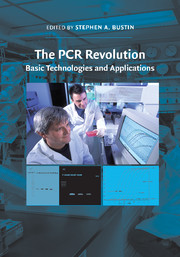Book contents
- Frontmatter
- Contents
- Contributors
- Foreword by Russell Higuchi
- Preface
- I BASIC TECHNOLOGIES
- II APPLICATIONS
- 10 Polymerase chain reaction–based methods for the detection of solid tumor cancer cells for clinical diagnostic and prognostic assays
- 11 Polymerase chain reaction and infectious diseases
- 12 Polymerase chain reaction and respiratory viruses
- 13 Polymerase chain reaction and severe acute respiratory syndrome
- 14 The MMR vaccine, measles virus, and autism – A cautionary tale
- 15 Noninvasive prenatal diagnosis using cell-free fetal nucleic acids in maternal plasma
- 16 Polymerase chain reaction–based analyses of nucleic acids from archival material
- 17 Microarrays and quantitative real-time reverse transcriptase–polymerase chain reaction
- 18 Polymerase chain reaction in the detection of genetic variation
- 19 Polymerase chain reaction: A blessing and a curse for ancient deoxyribonucleic acid research
- Index
- Plate section
- References
14 - The MMR vaccine, measles virus, and autism – A cautionary tale
Published online by Cambridge University Press: 25 January 2011
- Frontmatter
- Contents
- Contributors
- Foreword by Russell Higuchi
- Preface
- I BASIC TECHNOLOGIES
- II APPLICATIONS
- 10 Polymerase chain reaction–based methods for the detection of solid tumor cancer cells for clinical diagnostic and prognostic assays
- 11 Polymerase chain reaction and infectious diseases
- 12 Polymerase chain reaction and respiratory viruses
- 13 Polymerase chain reaction and severe acute respiratory syndrome
- 14 The MMR vaccine, measles virus, and autism – A cautionary tale
- 15 Noninvasive prenatal diagnosis using cell-free fetal nucleic acids in maternal plasma
- 16 Polymerase chain reaction–based analyses of nucleic acids from archival material
- 17 Microarrays and quantitative real-time reverse transcriptase–polymerase chain reaction
- 18 Polymerase chain reaction in the detection of genetic variation
- 19 Polymerase chain reaction: A blessing and a curse for ancient deoxyribonucleic acid research
- Index
- Plate section
- References
Summary
Although real-time reverse transcription–polymerase chain reaction (RT–qPCR) technology has become widely implemented in molecular diagnostics, it is worth pausing to consider the tremendous potential for real harm inherent in using such a sensitive and potentially easily contaminated assay in a clinical setting. Its central role in the controversy surrounding the triple measles, mumps, and rubella (MMR) virus vaccine, gut pathology, and autism serves as a textbook example of the enormous implications for the health of individuals that result from inappropriate use of this technology.
In 1996, a UK legal firm approached a gastroenterologist, Dr. Andrew Wakefield, who was then working at the Royal Free Hospital in London. He was asked to examine a group of children whose parents believed that their children's behavioral symptoms were directly caused by the MMR vaccine. In a 1998 Lancet publication, Wakefield reported on twelve autistic children with intestinal abnormalities, eight of whom had been supposedly affected after receiving the MMR vaccine. Although stating that the findings did not prove an association between the MMR vaccine and the syndrome described, the article raised the possibility of a causal link between MMR, gut pathology, and autism. Wakefield later went on to speculate that the measles component of the vaccine had infected the children's intestines and in some way caused brain damage.
- Type
- Chapter
- Information
- The PCR RevolutionBasic Technologies and Applications, pp. 229 - 242Publisher: Cambridge University PressPrint publication year: 2009



